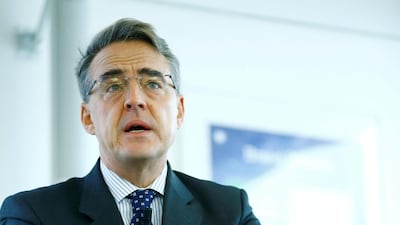The International Air Transport Association expects the impact of the Covid-19 pandemic on economic conditions will damage passenger confidence and slow the recovery of air travel demand over the next six months.
An Iata-commissioned survey of passengers found that 40 per cent would wait six months or longer to travel after the virus is contained, 47 per cent would wait up to two months to travel and only 14 per cent would travel immediately, according to the April survey conducted in 11 countries, including the UAE. Almost 70 per cent said they could delay travelling until their personal financial situation stabilises.
"The economic environment that we're expecting in the next six months is not really conducive to a substantial return to air travel for financial reasons ... we are expecting recovery in the third quarter to be relatively modest," Brian Pearce, chief economist of Iata, told reporters on a conference call.
The global airline industry is forecast to lose $314 billion (Dh1.15bn) in passenger revenue this year as the coronavirus decimates air travel demand, according to Iata's latest estimates.
Even after the deadly virus is eventually contained, passenger confidence will be dented by the "double whammy" of a looming global economic recession in addition to concerns about the safety of travel, the industry's representative body said.
"We need to see measures to help restore passenger confidence to generate demand for air travel," Mr Pearce said. "Without new measures, we see a slow recovery of demand when markets open."
Once lockdown measures lift, air travel will resume in stages led by domestic markets in the third quarter, followed by regional, continental and inter-continental services over a period of a "few months" with a full return to operations unlikely before the fourth quarter, Alexandre de Juniac, Iata's director general said on the conference call.
This will be a challenge for the biggest carriers in the Gulf, who rely on funnelling intercontinental traffic through their hubs.
"That's an issue for ... super-connectors in the Gulf," Mr Pearce said, adding that regional travel between the Middle East and India will recover more quickly.
Measures to boost passenger confidence are critical to the recovery of air travel demand, including steps by governments and health authorities to limit the spread of the virus between travellers.
To that end, Iata is holding a series of regional summits this week with governments and industry stakeholders to discuss plans to re-start air travel.
The aim is to define harmonised measures, particularly on sanitisation and health safety, that can be endorsed by governments and applied across the industry, Mr de Juniac said.
When air travel resumes, social distancing norms may further damage airline revenues. Some airlines have already begun to leave one row of seating unused, which would lead to at least one-third of seats on short-to-medium haul flights remaining unused. This would make services economically unviable unless ticket prices are raised by at least 50 per cent, Mr de Juniac said.
"If social distancing is imposed, then cheap travel is over forever," he said.
If such spacing rules are deemed necessary by the authorities, the maximum load factor on short haul flights will be about 66 per cent but at least 70 per cent of seats need to be filled in order to break even, Mr Pearce said.
"It will have a negative impact on the economics of short-haul flying," he said.
Iata urged governments to quickly implement rescue packages for airlines as the crisis deepens, highlighting the example of Virgin Australia that entered voluntary administration.


